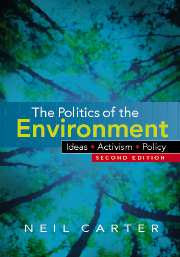Book contents
- Frontmatter
- Contents
- List of figures
- List of tables
- List of boxes
- Preface to the second edition
- Acknowledgements
- Abbreviations
- Glossary
- 1 Introduction
- PART 1 Theory: thinking about the environment
- PART 2 Parties and movements: getting from here to there
- 4 Green parties: the rise of a new politics?
- 5 Party politics and the environment
- 6 Environmental groups
- PART 3 Environmental policy: achieving a sustainable society
- References
- Index
6 - Environmental groups
from PART 2 - Parties and movements: getting from here to there
Published online by Cambridge University Press: 05 June 2012
- Frontmatter
- Contents
- List of figures
- List of tables
- List of boxes
- Preface to the second edition
- Acknowledgements
- Abbreviations
- Glossary
- 1 Introduction
- PART 1 Theory: thinking about the environment
- PART 2 Parties and movements: getting from here to there
- 4 Green parties: the rise of a new politics?
- 5 Party politics and the environment
- 6 Environmental groups
- PART 3 Environmental policy: achieving a sustainable society
- References
- Index
Summary
Key issues
◗ How powerful is the contemporary environmental movement?
◗ In what ways – size, organisation, strategy, tactics – do groups differ?
◗ How do groups exert influence?
◗ Why has there been a resurgence of grassroots activism?
◗ What impact have environmental groups had?
Environmental pressure groups (EPGs) are probably the most visible expression of contemporary environmental concern. The publicity-seeking stunts and daring deeds of the direct action protesters, whether tiny Greenpeace dinghies bobbing on the waves alongside ocean whalers or anti-road protesters perched at the top of trees, have attracted enormous public attention. Most pressure-group activity, however, involves rather more mundane conventional political activities such as lobbying and education. The rapid growth of the environmental movement since the mid-1980s has provided the resources for some groups to become highly professional organisations and to win regular access to policy elites. There is little doubt that environmental groups have been the most effective movement fighting for progressive environmental change, particularly in those countries such as the USA and UK where there is no successful green party and established parties have been largely unresponsive to environmental problems. Nevertheless, this process of institutionalisation involved compromises that blunted the radical edge of large groups such as Friends of the Earth and Greenpeace, and contributed to the resurgence of grassroots environmental groups during the 1990s, including the UK anti-roads protesters and the US environmental justice movement.
- Type
- Chapter
- Information
- The Politics of the EnvironmentIdeas, Activism, Policy, pp. 143 - 170Publisher: Cambridge University PressPrint publication year: 2007



